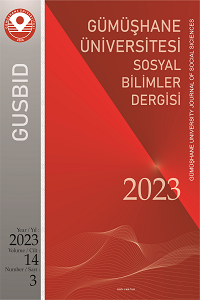Öz
In this paper, we attempt to investigate the effect of usage of pirated software on productivity by utilizing three distinct indicators of productivity for developing countries and an unbalanced panel data set containing the years between 2003 and 2017. Our hypothesis claims that increase in the use of pirated software enhance the productivity level in developing countries. Firstly, we implemented univariate analyses and the results of univariate analyses implied that the usage of pirated software and productivity are positively and significantly related in all of three models. Secondly, three control variables (i.e., education, investment, and openness) were employed in our three productivity models in order to check if the findings of univariate analyses remain valid and robust. After inclusion of the three control variables, the statistically significant positive association between the use of pirated software and productivity were observed in all models. Regarding to control variables, they take expected signs whenever they are statistically significant.
Anahtar Kelimeler
Software Piracy Productivity Developing Countries Panel Study
Kaynakça
- Abramova, N., & Grishchenko, N. (2020). ICTs, labour productivity and employment: Sustainability in industries in Russia. Procedia Manufacturing, 43, 299-305.
- Aghion, P., Bacchetta, P., Ranciere, R., & Rogoff, K. (2009). Exchange rate volatility and productivity growth: The role of financial development. Journal of Monetary Economics, 56(4), 494-513.
- Arazmuradov, A., Martini, G., & Scotti, D. (2014). Determinants of total factor productivity in former Soviet Union economies: A stochastic frontier approach. Economic Systems, 38(1), 115-135.
- Andrés, A. R., Asongu, S. A., & Amavilah, V. (2015). The impact of formal institutions on knowledge economy. Journal of the Knowledge Economy, 6(4), 1034-1062.
- Andrés, A. R., & Goel, R. K. (2012). Does software piracy affect economic growth? Evidence across countries. Journal of policy modeling, 34(2), 284-295.
- Asongu, S. A. (2014). Software piracy and scientific publications: Knowledge economy evidence from Africa. African Development Review, 26(4), 572-583.
- Asongu, S. (2014). Software piracy, inequality, and the poor: Evidence from Africa. Journal of Economic Studies, 41(4), 526-553.
- Asongu, S. A. (2021). Global software piracy, technology, and property rights institutions. Journal of the Knowledge Economy, 12(3), 1036-1063.
- Asongu, S. A., & Andrés, A. R. (2017). The impact of software piracy on inclusive human development: Evidence from Africa. International Review of Applied Economics, 31(5), 585-607.
- Baier, S. L., Dwyer Jr, G. P., & Tamura, R. (2006). How important are capital and total factor productivity for economic growth?. Economic Inquiry, 44(1), 23-49.
Öz
Bu çalışma korsan yazılım kullanımının verimlilik üzerindeki etkisini sorgulamayı amaçlamaktadır. Bu kapsamda 2003-2017 dönemini kapsayan dengesiz panel veri seti ile gelişmekte olan ülkeler için verimliliğin üç farklı göstergesi modellere dahil edilmiştir. Çalışmanın hipotezi; korsan yazılım kullanımındaki artışın gelişmekte olan ekonomilerde verimlilik düzeyini arttıracağını iddia etmektedir. İlk olarak, tek değişkenli analizler uygulanmış ve üç ayrı modellerdeki analiz sonuçlarına göre korsan yazılım kullanımı ve verimlilik arasında istatistiksel olarak anlamlı bir pozitif yönlü ilişki olduğu görülmüştür. İkinci olarak, tek değişkenli analizlerimizin bulgularının geçerliliği ve sağlamlılığını kontrol etmek için ayrıca eğitim, yatırım ve açıklık gibi üç kontrol değişkeni çalışmadaki üç ayrı verimlilik modelimize dahil edilmiştir. Üç kontrol değişkeninin modellere dahil edilmesi sonrasında elde edilen sonuçlara göre; tüm modellerde korsan yazılım kullanımı ile verimlilik arasında yine istatistiksel olarak anlamlı bir pozitif yönlü ilişki gözlemlenmiştir. Ek olarak, modellere dahil edilen ve istatistiksel olarak anlamlı sonuç veren tüm kontrol değişkenlerinin de literatür de beklenen işaretleri aldığı görülmüştür.
Anahtar Kelimeler
Yazılım Korsanlığı Verimlilik Gelişmekte Olan Ülkeler Panel Çalışma
Kaynakça
- Abramova, N., & Grishchenko, N. (2020). ICTs, labour productivity and employment: Sustainability in industries in Russia. Procedia Manufacturing, 43, 299-305.
- Aghion, P., Bacchetta, P., Ranciere, R., & Rogoff, K. (2009). Exchange rate volatility and productivity growth: The role of financial development. Journal of Monetary Economics, 56(4), 494-513.
- Arazmuradov, A., Martini, G., & Scotti, D. (2014). Determinants of total factor productivity in former Soviet Union economies: A stochastic frontier approach. Economic Systems, 38(1), 115-135.
- Andrés, A. R., Asongu, S. A., & Amavilah, V. (2015). The impact of formal institutions on knowledge economy. Journal of the Knowledge Economy, 6(4), 1034-1062.
- Andrés, A. R., & Goel, R. K. (2012). Does software piracy affect economic growth? Evidence across countries. Journal of policy modeling, 34(2), 284-295.
- Asongu, S. A. (2014). Software piracy and scientific publications: Knowledge economy evidence from Africa. African Development Review, 26(4), 572-583.
- Asongu, S. (2014). Software piracy, inequality, and the poor: Evidence from Africa. Journal of Economic Studies, 41(4), 526-553.
- Asongu, S. A. (2021). Global software piracy, technology, and property rights institutions. Journal of the Knowledge Economy, 12(3), 1036-1063.
- Asongu, S. A., & Andrés, A. R. (2017). The impact of software piracy on inclusive human development: Evidence from Africa. International Review of Applied Economics, 31(5), 585-607.
- Baier, S. L., Dwyer Jr, G. P., & Tamura, R. (2006). How important are capital and total factor productivity for economic growth?. Economic Inquiry, 44(1), 23-49.
Ayrıntılar
| Birincil Dil | İngilizce |
|---|---|
| Bölüm | Makaleler |
| Yazarlar | |
| Yayımlanma Tarihi | 9 Ekim 2023 |
| Gönderilme Tarihi | 30 Mart 2023 |
| Yayımlandığı Sayı | Yıl 2023 Cilt: 14 Sayı: 3 |



